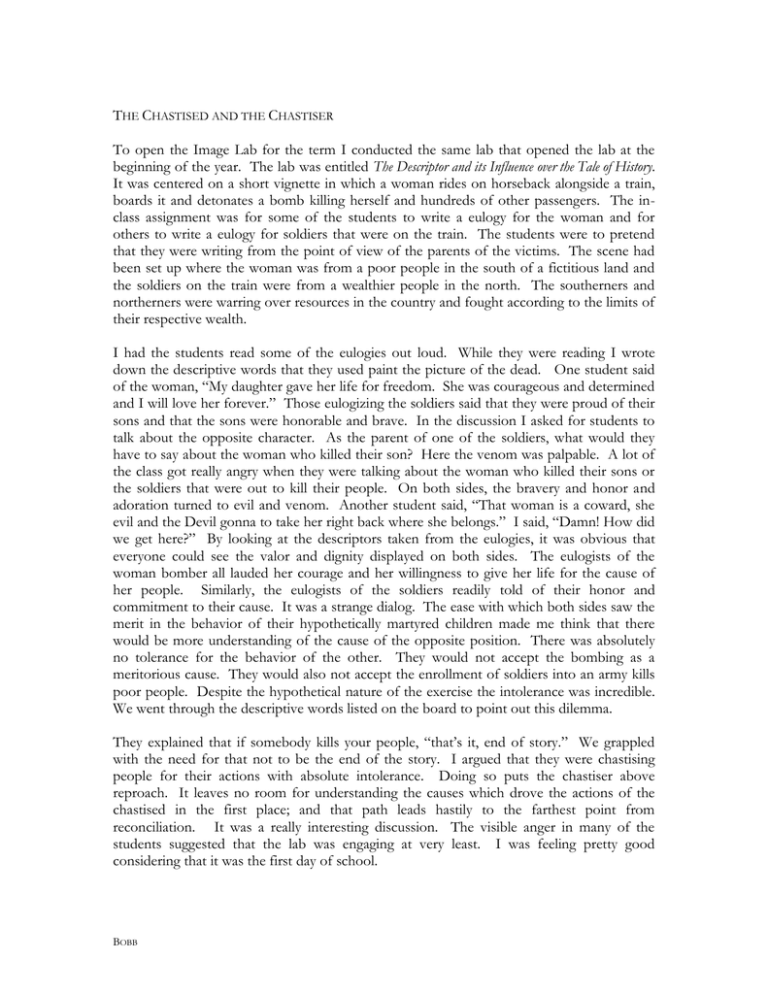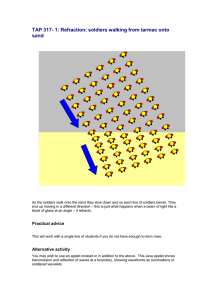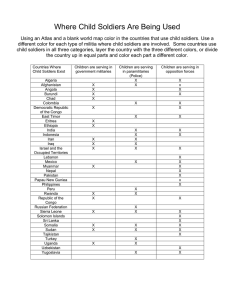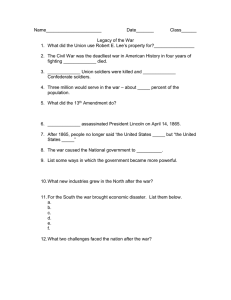The Chastized and the Chastizer.doc: uploaded 28 January 2016 at 11:21 am
advertisement

THE CHASTISED AND THE CHASTISER To open the Image Lab for the term I conducted the same lab that opened the lab at the beginning of the year. The lab was entitled The Descriptor and its Influence over the Tale of History. It was centered on a short vignette in which a woman rides on horseback alongside a train, boards it and detonates a bomb killing herself and hundreds of other passengers. The inclass assignment was for some of the students to write a eulogy for the woman and for others to write a eulogy for soldiers that were on the train. The students were to pretend that they were writing from the point of view of the parents of the victims. The scene had been set up where the woman was from a poor people in the south of a fictitious land and the soldiers on the train were from a wealthier people in the north. The southerners and northerners were warring over resources in the country and fought according to the limits of their respective wealth. I had the students read some of the eulogies out loud. While they were reading I wrote down the descriptive words that they used paint the picture of the dead. One student said of the woman, “My daughter gave her life for freedom. She was courageous and determined and I will love her forever.” Those eulogizing the soldiers said that they were proud of their sons and that the sons were honorable and brave. In the discussion I asked for students to talk about the opposite character. As the parent of one of the soldiers, what would they have to say about the woman who killed their son? Here the venom was palpable. A lot of the class got really angry when they were talking about the woman who killed their sons or the soldiers that were out to kill their people. On both sides, the bravery and honor and adoration turned to evil and venom. Another student said, “That woman is a coward, she evil and the Devil gonna to take her right back where she belongs.” I said, “Damn! How did we get here?” By looking at the descriptors taken from the eulogies, it was obvious that everyone could see the valor and dignity displayed on both sides. The eulogists of the woman bomber all lauded her courage and her willingness to give her life for the cause of her people. Similarly, the eulogists of the soldiers readily told of their honor and commitment to their cause. It was a strange dialog. The ease with which both sides saw the merit in the behavior of their hypothetically martyred children made me think that there would be more understanding of the cause of the opposite position. There was absolutely no tolerance for the behavior of the other. They would not accept the bombing as a meritorious cause. They would also not accept the enrollment of soldiers into an army kills poor people. Despite the hypothetical nature of the exercise the intolerance was incredible. We went through the descriptive words listed on the board to point out this dilemma. They explained that if somebody kills your people, “that’s it, end of story.” We grappled with the need for that not to be the end of the story. I argued that they were chastising people for their actions with absolute intolerance. Doing so puts the chastiser above reproach. It leaves no room for understanding the causes which drove the actions of the chastised in the first place; and that path leads hastily to the farthest point from reconciliation. It was a really interesting discussion. The visible anger in many of the students suggested that the lab was engaging at very least. I was feeling pretty good considering that it was the first day of school. BOBB Two of the three classes that Jill teaches have an assigned team teacher to help with the Special Ed students. The teacher this term is a German born white woman with just a hint of the hard-edged-word German accent remaining. She announced to the class that she has been teaching for nearly thirty years. She is tall, approximately 5’,9” or 10”. Unlike the Special Ed sub from last term, she is immaculately dressed and has an air of authority about her. After the second class, she asked to speak with me about the lab and the handling of the Special Ed students. When we sat down, the first thing she said was, “I have to tell you I’ve heard a lot of great things about you and the Image Lab that you do, but you cannot use profanity in front of the students here.” She delivered the thought in a stern and mildly condescending tone. Profanity? I was puzzled by that, but before I could ask she continued. Furthermore she said that she didn’t think that my careless spoken English was appropriate for the classroom either. She said that my bringing street talk into the classroom is a disservice to the students in that it prevents them from hearing and being forced to use standard American English. By now I was raging, but thought it funny that the President of the United States speaks the way he does and this woman is upbraiding me for my language. I do not subscribe to using profanity in the classroom and reject the arguments that popular culture embraces it, the students are exposed to it and therefore it is acceptable in the classroom. I asked what profanity she was referring to. She said that after one of the students responded to my question about opinions of the other child in the story, I said “Damn.” Damn. She returned to my speech and said that there are Special Ed students in the class as well as students for whom English is a second language. Both sets of these students she said would have difficulty understanding my speech. In addition, I am letting the black students down because I am not demonstrating for them a higher mode of communication. I responded that while I do not speak the Queen’s English, I certainly do not speak the President’s English either. I am well aware that slang can be a vice that strangles both effective expression and description. I do not think, however, that it is completely inappropriate when used in concert with an array of other, more traditionally acceptable words. I also agreed with her concerns about the Special Ed students and the second language students and indeed, I had not thought about their possible difficulties understanding me. She continued to speak as if I hadn’t acknowledged the merit in her position. She said that she thought that my mode of speech was condescending particularly to the black students. She thought that I was not extending to them the expectation that they can communicate in standard English and that I am therefore belittling their intelligence. She told me that I would be surprised by what they could achieve. It struck me as odd that she did not seem to recognize the impact of the lesson we had just walked out of, the title of which was The Descriptor and its Influence over the Tale of History. The whole point of the lesson was to point out the strength of descriptive words and the influence they have over one’s ability to adopt attitudes of contrition and reconciliation. The central component of the lab was my writing down descriptive words that were used in the students’ eulogies. We then used those words to construct different historical records of the single event. Given that, how could she conclude that I am belittling the intelligence of the students? As I was fuming and musing over that, she inadvertently answered my question. BOBB By way of summary she said, “You that I am probably looking at me and thinking, ‘This old white bitch is just complaining and complaining about things that I don’t care about.’ Shit, I would if I were you; but just think about it.” I was stunned. I responded, “No. In fact, those words didn’t cross my mind.” There was nothing about the way I spoke with her, or anyone else in the school for that matter, that ought to have made her feel comfortable speaking with me in that manner. It may be that she saw me as a youth and felt that she could speak with me anyhow. According to her own argument though, that would be inconsistent as she would be negatively influencing me. Her tone and posturing and now her language made me feel that this was her connection mechanism. In order to connect with me she felt the need to speak using this crass language. America makes you hypersensitive to racial assaults. Immediately I wondered if she would have spoken to any of my white counterparts in the same way. I simply cannot imagine her speaking to a white senior level doctoral candidate from the Georgia Institute of Technology beginning with, this old white bitch. She was profoundly guilty of the condescension and degradation she charged me with. It was remarkable to be charged with and assaulted by the same crime within an instant. Her language suggested that she did not respect my professionalism enough to warrant speaking to me in a professional manner. Her point suggested that she did not think I am mature enough to separate a message from its messenger. The whole situation suggested that she has a fundamental disrespect for black intellect. One might argue that I have taken a mundane story and made a fantastic extrapolation. Maybe. If so, then I bear the burden. If not, then the students bear the burden and the stakes are too high not to consider that possibility. One of the consequences of her position and attitude is precisely what she explained to me. The belittling of intellect. Her disregard for mine enabled her to chastise me with the same absolute intolerance that came up during the lab. She was blind to any possible merits of the lesson and was hung up on haranguing me about my speech patterns and saying “damn.” A longstanding joke/lament is that white people often describe black persons of intellect and vision as being articulate. “He is just so articulate.” This was that situation. At the center is a black person with an idea that is arguably a good one. In this case, I dare say, the lesson was interesting, engaging and could not be more timely. Overlooking the idea she chastised me about my language. I can imagine that if my language met her expectations she may well have described my presentation as being “very articulate.” In both cases the merit of the idea itself is completely disregarded because of her belittling the intellect. That posture is dangerous to young students. It can begin to slowly reorder their value systems. They may become reluctant to express their ideas for fear of being chastised because of the way in which they express them. Of course, I am not suggesting that students do not develop proper and appropriate skills of expression. Her attitude, however, places a premium on her comfort at the expense of black intellectual development. She will laud those who speak and behave as she would like them to and discourage those who cannot or will not. In both cases though, their ideas are not center stage. With ideas being devalued, students are not forced to develop their ideological strength which ought to be the focal point of everyone’s attention. It does not encourage the creative risk taking needed to formulate original ideas or support the intellectual rigor required to defend them. Taken to BOBB its logical end, you will have students that speak with dollar words to convey nickel thoughts and students with nickel words saying nothing. BOBB



